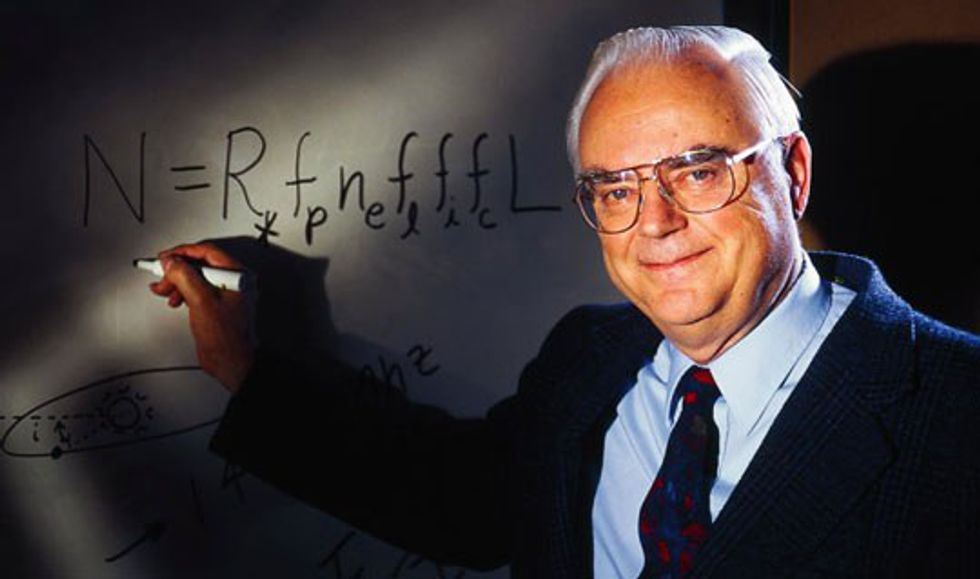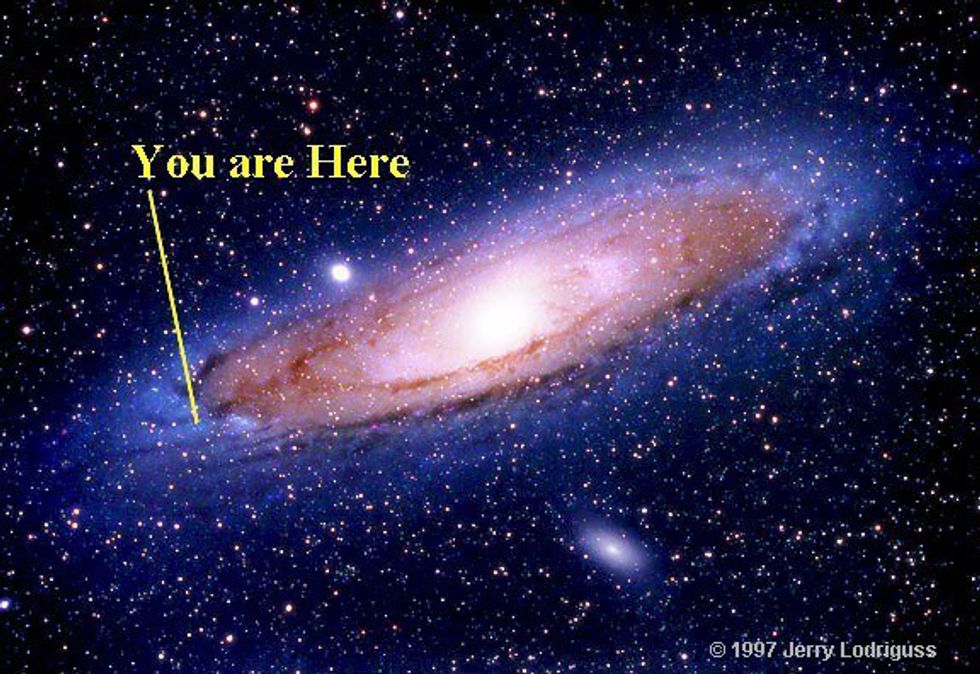Star Warsmade us think that two things would be more prevalent in our lives: aliens and laser swords (that one in particular really got to me). I mean, sure, aliens are in our movies, our TV shows, our books, but no one has seen them in real life. As far as we know.
Shut up, Mulder.
Ok, fine, I’m done with the X-Files references. Probably. The idea of intelligent life out there has so captivated us that one of the greatest questions of the human race is “Are we alone,” the answer to which is typically “Get a job.”
Well, as usual, science has a better answer. Go science. In 1961, Dr. Frank Drake (no relation to an honest duck) came up with the Drake equation (also nothing to do with ducks), which, based on a couple of variables including the average rate of star formation, planets that can support life, and time, predicts the number of alien civilizations in our galaxy.
Dr. Frank Drake
It’s a pretty controversial theory, especially because one variable is the number of planets that produce intelligent life, and as far as we know, that number is “one.” Still, some people give the equation a chance, and when they do, the number of alien civilizations that pops out is about 100,000 — that’s 100,000 civilizations that are dead quiet, despite us sending tons and tons of messages out into the cosmos. To quote the wordsmith Future, “Where Ya At (ft. Drake)?”
That’s called the Fermi paradox: if the galaxy, let alone the universe, is so chock full of life, why isn’t anyone answering our calls?
Well, there are a couple possible answers. There might be civilizations so far in advance of us that they don’t think we’re worth talking to. You know how you think about an ant? Yeah.
Then again, there could be civilizations out there that are getting our calls but just think they’re part of the background noise of the universe — there’s a lot of that. On the flip side, there might be civilizations that are trying to contact us (how nice of them), but we might not know what to look for because of that whole background noise thing.
It could be that advanced civilizations exist, just really far away from us. You’ve got to remember that we’re pretty much on the edge of the Milky Way, just about as far away as you can get from the center, where there are oodles of stars really close to each other. Some civilizations might be hanging out in their little neighborhood in the galaxy center and not want to come out and say hi to us in the boonies.
Another, significantly more terrifying answer, as the ever-optimistic Stephen Hawking points out, is that there might be one civilization going 86’ing other civilizations that we could potentially communicate with — potentially for resources, or just because they’re huge space jerks. This isn’t as outlandish as you might think, especially since we have some instances of this in our own history. Anyone remember Columbus?
Don’t get comfy yet, though. There’s an even scarier possibility than Space Columbus: it’s called the Great Filter, and no, that’s not something that looks good on Instagram.
The Great Filter is, hypothetically, a point on the evolutionary pathway of all species that is impossible to overcome, and once any species reaches the Filter, it dies out.
Definitely not an Instagram thing.
So, there are a couple theories on our place in relation to the Great Filter: we could already be past it (yay!) and be the only species that has done so — ever (yay?). Alternatively, we could have passed it (yay) because the conditions of the universe have only recently become favorable to life, and a couple species would be on their way to join us (also yay). Alternatively again, we could be on our way to the Filter, which may have knocked off any number of species before us (gulp).
If you think about it, there are any number of filters that might end our civilization: climate change, disease, Trump. We’re on thin ice here, people.
Then again, humans deserve a pat on the back for getting as far as we did: we evolved from some lousy bacteria to a species that can watch House of Cards on our phones. And, also, has House of Cards. That’s some serious progress.
If there’s anything that science has taught us about life, it’s that life is resilient. We’ve found things that live in arsenic, for Pete’s sake.
As for what that says about aliens, scientists are finding more and more potentially habitable planets every day, with environments a lot more welcoming than arsenic.
So, some day, we might find ET. Don’t let the Scullys get you down.
I guess I wasn’t done with the X-Files references.
Next week: habitable planets, the Kardashev scale, and going boldly where no man has gone before.


























